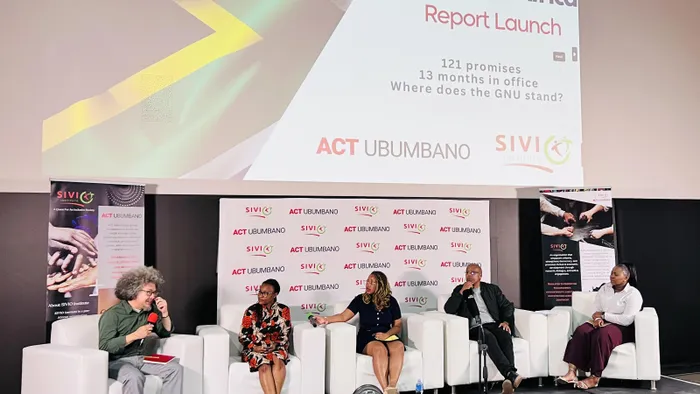South Africa's Government of National Unity: A year of unfulfilled promises

One Year On: South Africa's Unity Government Shows Limited Progress, Report Finds
Image: IOL Graphic
As South Africa marks the first anniversary of its Government of National Unity (GNU), an independent assessment released yesterday by the SIVIO Institute through its African Citizens Watch (ACW) Tracker reveals a coalition grappling with high expectations, internal disagreements, and the stark realities of governance in a time of fiscal austerity.
The report, unveiled at Wits University, traces the GNU’s formation following the fragmented 2024 elections, the first in South African history in which no single party won a parliamentary majority.
The coalition comprises ten political parties, including the African National Congress (ANC), the Democratic Alliance (DA), and smaller parties, all united behind President Cyril Ramaphosa’s call for “stability, unity, and effective governance.”
According to the report, the GNU set an ambitious agenda by targeting five critical sectors: the economy (36% of promises), social services (33%), governance (21%), corruption (5%), and climate change (4%).
Yet, after tracking 121 explicit government promises over the past year, the “Finding Their Feet: South Africa’s Government of National Unity First Anniversary Report” (Mfuto, Jowah & Cross, 2025) paints a sobering picture.
Only 9% of promises show measurable progress, with none fully implemented, and the majority still either underway or not commenced.
Economic commitments, the largest cluster, demonstrate persistent challenges. Of 44 promises, just 23% are under way, with the sector receiving a modest 12% assessment score overall.
Among these, the “One Stop Shops” initiative, aimed at supporting small and medium enterprises (SMEs), has shown slow execution. Despite a R500 million allocation for the Spaza Shop Support Fund intended to empower township entrepreneurs, only R6 million (1.2%) had been disbursed by mid-2025.

SIVIO Report: South Africa's GNU Struggles to Implement Ambitious Agenda
Image: Thabo Makwakwa
According to the report, further straining the economy, the GNU faced a protracted and contentious budget process marked by multiple iterations, including a controversial VAT increase proposal from 15% to 17%.
This impasse delayed budget approval, forced austerity measures that cut infrastructure spending by R13 billion, and slashed planned social grant increases by 80%.
Resulting downgrades in growth forecasts from 1.9% to 1.4% compounded the impact, shaking investor confidence.
“The prolonged budget impasse destabilised investor confidence and undermined growth projections,” the report noted, highlighting how coalition politics have hampered coherent economic policymaking.
The authors also found that the promises for the governance sector fared worse, showing a mere 4% overall progress.
“The main advancement lies in the launch of Phase II of Operation Vulindlela, which focuses on digital transformation and reforming local government systems. Endorsed by the Cabinet, this initiative seeks to modernise public sector operations, aiming for a more efficient, transparent, and citizen-centred state,” read the report.
The report found that corruption remains a stubborn challenge.
“While key promises such as establishing independent investigative bodies remain unfulfilled, there has been progress, including the recovery of R67 million in stolen public assets.”
However, the report cautions that these efforts “fall short of the scale and urgency required” to restore public trust.
Perhaps most alarmingly, all six climate change-related promises — from green energy investment to establishing a Climate Change Response Fund — have yet to be initiated.
“This lack of action is not just a policy gap—it is a crisis of accountability and foresight,” the report warns.
“Persistent reliance on coal and insufficient interdepartmental coordination have perpetuated policy stagnation even as climate risks escalate.”
Despite initial failure to pass the Budget earlier this year, the report stated that Social services saw some modest gains (11%), mostly in education, where the government allocated over R15 billion to infrastructure upgrades and feeding programs benefiting over nine million learners daily.
“Notable progress includes 97% completion of sanitation improvements aimed at eradicating pit toilets from schools,” Mfuto said, citing recent advances like the Basic Education Laws Amendment Act, which mandates compulsory Grade R and bans corporal punishment.
Yet, these advances remain threatened by budget cuts and delays.
In the report, Mfuto argued that Health and social protection programs suffer from stalled implementation and insufficient real-term growth, worsened by the fiscal austerity stemming from the budget crisis.
The report highlights a palpable public dissatisfaction, especially among youth voters, whose participation plunged sharply in the 2024 elections.
Adding to the grim outlook, the report referenced data from the South African Federation of Trade Unions (SAFTU), showing over 12.7 million unemployed, mostly long-term, an 18% decline in per capita social spending, and significant job losses in sectors such as education.
As the GNU confronts mounting coalition tensions and governance shortfalls, the report urges the government to “move beyond crisis management toward proactive governance” through renewed political accountability, ethical leadership, and institutional transformation.
“This first year has shown the immense complexity and difficulty of governing through coalition, fiscal constraints, and entrenched systemic issues,” Mfuto, lead author of the report, said.
“Our tracking indicates modest progress but highlights critical areas where the government needs not only to act but to act decisively.”
She added: “Transparency, data-driven monitoring, and citizen engagement are essential if South Africa’s democracy is to survive and thrive in these turbulent times.”
thabo.makwakwa@iol.co.za
IOL Politics
Related Topics: